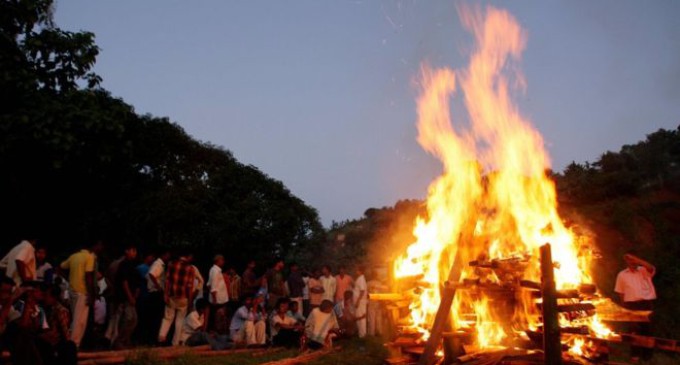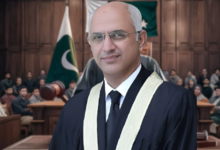The Long wait for Construction of Crematorium

PESHAWAR: Despite allocation of funds in the consecutive budgets of Khyber Pakhtunkhwa, the Hindu and Sikh religious minority communities in Peshawar are yet to have a crematorium (Shamshan Ghat) in the city for their communities so they can perform the last rites of their loved ones in line with their ancient religious traditions.
The non-availability of crematorium for Sikhs and Hindus in Peshawar has left the religious minority groups with no other option but to abandon the customary cremation of their dead. Instead, they are compelled to bury them like the majority Muslims and minority Christians or to transport the corpses to Attock district of Punjab province for the last rites according to their religious customs, as there is not a single crematorium in Peshawar or nearby districts to burn their loved ones.
Haroon Sarbdial – Chairman All Pakistan Hindu Rights Movement – told The Reporters that the only nearby crematorium is on the bank of River Kabul in Attock district of the Punjab province, at a distance of more than a hundred kilometres from Peshawar. “Our religion demands that we must perform a proper antim-sanskar (eds: Hindu term for cremation rites) of our dead but we are deprived of it here in Peshawar.” He added that at times, it becomes impossible to afford the cost to shift the body of the deceased and transport the attendants of the funeral rites to the crematorium in Attock district. “The government does not even provide us a vehicle to shift bodies of our deceased for cremation to Attock,” complains Sarbdial.
Although the provincial government, he says, set aside a handsome amount in the budget for minorities, but practically there is no progress even on acquiring land for crematorium let alone starting spadework on the project.
Gurpal Singh is Provincial Youth Assembly minister for Youth Affairs and a member of the six-man committee constituted to identify suitable places for crematorium. He said the committee was given clear instructions to find a site for crematorium not exceeding the limit of Rs. 100,000 for per marla. “We identified a number of sites in the city but their price was much higher than the limit set by the government,” says Gurpal. Gurpal says that they identified a number of sites for crematorium at suburban areas on Ring Road but the community rejected all of them, insisting on a site inside the city.
Gurdev Singh, an elder of the Sikh Community said that majority of Sikh Community people living in Peshawar are very poor as they are serving low rank jobs in government departments or they run small businesses and cannot afford the high expense of taking their dead to another province.
More than just the financial cost, sometimes due to long traffic jams they are unable to reach Attock during the daytime while there have also been instances where people in nearby areas have not let them cremate the bodies of their loved ones.
Hindu community member and social activist – Naina – told The Reporters that the Hindu and Sikh community members are facing difficulties due to the non-availability of crematorium in Peshawar and nearby districts. She said that while transporting the dead body to Attock, huge amount is required for transportation and facilitation of other people who accompany the bereaved family to the crematorium in far away areas. She maintained that majority of the Hindu and Sikh community members belong to low income class, cannot afford these expenses, and at times are compelled to take loans for last rites of their dead. However, she hoped that things seem to improve as the provincial government is taking serious steps to resolve all the outstanding issues of the religious minority groups.
Chairman Sikh Community Pakistan – Radesh Singh Toni – said that there are 60,000 people from the Sikh community living in different parts of Khyber Pakhtunkhwa whereas there are only 10,000 Sikh families in Peshawar.
He said that there is no crematorium for the Sikh community in Peshawar and nearby districts due to which the community faces a lot of difficulties and they have no other choice but to take their dead all the way to Attock district. He said that people of the Sikh community take their dead to Attock and their relatives also travel to Attock for the last rituals that cause lots of trouble for the bereaved families.
According to Singh, the provincial government had allocated funds for a crematorium in Peshawar several times but ultimately not utilized due to the unavailability of land in city areas. “It has been impossible to find land in Peshawar city in the allocated budget. Matrah area of Peshawar was considered however, the people of the Sikh Community people did not agree with the government in purchasing land in that area of Peshawar as it was out of the city and they felt that may pose as a security issue for them, he shared.
In 2020, the KP government allocated Rs 16 million to purchase land in seven districts including Peshawar, Swat, D I Khan, Chitral, Kohat, Nowshera and Bannu however, the per marla price of land in Peshawar was Rs 1 million to Rs 2 million while the total cost of five marla plot was nearly Rs 10 million.
According to Auqaf, Hajj, Religious and Minority Affairs Department Government of Khyber Pakhtunkhwa documents Rs 75, 600 million were allocated for 2021-22 to purchase land for minority graveyards and crematorium along with construction of boundary walls. The documents states that the new crematorium will be constructed in Peshawar, Kohat, Bannu and Nowshehra.
While Gurdev Sing appreciated government efforts to allocate the huge amount for construction of crematorium in different districts, he requested that they not repeat the previous practice of wasting the money and using the allocated amount on the right place and for the right purpose.
Sikh community head Peshawar Baba Gurpal Singh said that they had already filed writ petition in Peshawar High Court stating that the Khyber Pakhtunkhwa government had allocated millions for the establishment of crematorium and Christian graveyards, but the Department of Auqaf and Religious Affairs were employing delaying tactics.
He said that now they have chosen a place for construction of crematorium in Peshawar City on Ring Road and requested the government to start construction work as soon as possible. “This place not only accessible but also secure for us because it is near Peshawar city,” he said. “The allocated amount is enough but this time it should be utilized properly.” “We only need five marlas land for construction of crematorium and Rs 10 million would be sufficient for purchasing and construction of boundary walls of crematorium on Ring Road Peshawar,” he said.
According to Special Assistant to Chief Minister on Minorities Affairs Wazir Zada, the government has been interested in allocating funds for this purpose, the only problem was the purchasing of land in Peshawar city.
He shared that every ADP government allocated funds for this purpose to construct specific places for minorities but due to unavailability of land in the city, the project has remained unfinished. He said that this time government has taken this matter very seriously and has started construction work in Kohat and Chitral. He said that very soon the construction work would be started here in Peshawar, Bannu and Noweshra crematorium.
About their demand for a graveyard as there is no concept of burial in Hindu faith, Haroon Sarbdial says local religious leaders of the Hindus and Sikhs have issued a decree that those who cannot afford to cremate their deceased they can bury them. However, it has been made mandatory upon them to put a burning coin on the hand of the deceased, ensuring that some part of his/her body has been cremated.
According to representatives of the Sikh and Hindu community, there were at least six crematoriums in Peshawar at the time of partition: one each in Ramdas, Asia Park, Chacha Younas Park, Qauidabad and two in Nothia. Now they are either in the control of Evacuee Trust Property Board ((ETPB), city government or occupied by the people who are using them for residential purposes.




